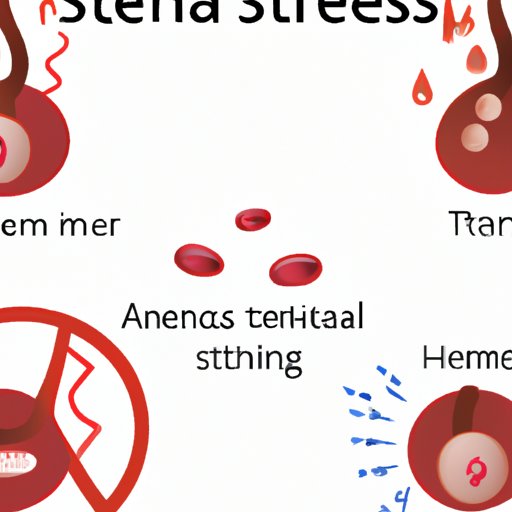
Introduction
Anemia is a condition that develops when the body doesn’t have enough red blood cells to transport oxygen to its tissues. This can lead to fatigue, shortness of breath, and dizziness, among other symptoms. While anemia has many causes, including iron-deficiency, genetics, and chronic illnesses like inflammatory bowel disease, have you ever wondered if stress could play a role in its development? In this article, we will explore the link between stress and anemia, the impact of stress on both physical and emotional health, and strategies for managing stress and preventing anemia.
Symptoms and Causes of Anemia
Anemia is a condition that occurs when there are not enough red blood cells in the body, or when the body doesn’t produce enough hemoglobin, the protein in red blood cells that carries oxygen. The common symptoms of anemia include fatigue, weakness, pale skin, shortness of breath, and dizziness. Anemia can occur due to various factors such as blood loss, heredity, or a deficiency in certain nutrients like iron, vitamin B12, and folic acid.
Iron-deficiency anemia is the most common form of anemia, and it occurs when the body doesn’t have enough iron to produce hemoglobin. This often happens due to a lack of iron in the diet, or the body’s inability to absorb iron correctly. Interestingly, stress has been shown to play a role in the development of iron-deficiency anemia.
Can Stress Really Cause Anemia?
Stress plays a significant role in our body’s immune response, and research has shown that it can affect the production of red blood cells, leading to anemia. Stress can trigger the body’s fight or flight response, which causes an increase in blood pressure and heart rate and prepares the body to deal with a threat. This stress response can lead to the release of certain hormones like cortisol, which can interfere with the absorption of iron and the production of red blood cells.
Research has shown that chronic stress triggers the suppression of erythropoietin (EPO) production in the body, a hormone responsible for stimulating red blood cell production in the bone marrow. Over time, this translates into a decrease in red blood cells, contributing to the development of anemia. Additionally, stress can also cause decreased nutrient absorption by damaging the intestinal lining, including the absorption of iron.
Understanding the Link Between Stress and Anemia, and How to Manage Both
Managing stress and preventing anemia can be achieved using various strategies. It is essential to understand that stress can contribute to the development of anemia, but it is not the sole cause. The impact of stress on the body varies from person to person, and its severity can depend on various factors such as the individual’s emotional resilience, sleep quality, diet, and lifestyle. Therefore, it is important to identify the root causes of stress and establish a plan for managing it.
For managing stress, it is helpful to take a holistic approach that addresses both physical and emotional wellbeing. This strategy may include regular exercise, a balanced diet, sleep hygiene, and relaxation techniques like meditation, deep breathing exercises, and yoga. Additionally, setting realistic goals, prioritizing self-care, and seeking therapy or counseling can be beneficial.
The Emotional Strain on Anemia Patients: How Stress Can Worsen The Condition and How to Cope
Living with anemia can be emotionally challenging, and stress can exacerbate the condition. Patients may experience feelings of isolation, depression, and anxiety. Coping with anemia requires a holistic approach that encompasses both physical and emotional wellbeing.
To manage the emotional strain of anemia, it can be helpful to connect with support groups or organizations that provide resources and information on the condition. Establishing a support network of friends and loved ones can help alleviate feelings of isolation and provide comfort and encouragement. It is also important to practice self-compassion and take the necessary steps to manage the emotional impact of the condition.
When Stress Hijacks Your Body: How it Affects Your Immune System, Blood Cells, and Anemia
Stress can take a toll on the body’s immune system and blood cells, leading to a host of health problems. Chronic stress weakens the immune system, making the body more susceptible to infections, and impairs the body’s ability to produce red blood cells. This effect of stress on the immune system can worsen the condition of anemia, making it more difficult to manage symptoms.
To manage the impact of stress on anemia, it is vital to seek medical attention and work with a healthcare provider or specialist. A physician may recommend a combination of treatments such as iron supplements, dietary changes, and medication to manage the condition effectively.
From Anxiety to Anemia: Tips on Managing Stress to Prevent and Ease Anemia Symptoms
Preventing and managing anemia requires a proactive approach to stress management. This entails identifying the causes of stress and making lifestyle changes that promote wellbeing. A few tips for managing stress to prevent and ease anemia symptoms include:
- Staying hydrated by drinking plenty of water
- Eating a well-balanced diet that includes iron-rich foods like leafy greens, beans, and red meat
- Reducing alcohol and caffeine intake
- Incorporating stress-reducing exercises like yoga, deep breathing, and meditation into daily routine
Conclusion
In conclusion, stress can indeed play a role in the development of anemia, particularly iron-deficiency anemia, by affecting the body’s ability to produce red blood cells. Managing stress and preventing anemia requires a holistic approach that addresses both physical and emotional wellbeing. By identifying the causes of stress, adopting healthy coping mechanisms, and taking proactive measures to promote wellbeing, it is possible to manage this condition effectively. Remember to seek medical attention if symptoms persist, and prioritize self-care to maintain overall health and balance.





